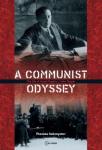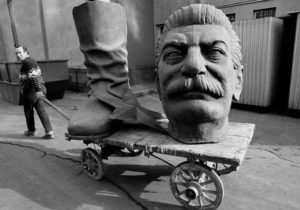UKRAINE’S PRESIDENT Viktor Yanukovich appears to have been driven from power after the mass protest movement that has occupied Kiev’s Maidan (Independence Square) since November survived a deadly crackdown last week. In a matter of days, the country’s corrupt and autocratic regime was overwhelmed.
My problem with Julia's analysis is that it repeats the standard line that is being repeated throughout the press regardless of political point of view. I think there are two main problems with this party line.
By: Dan La BotzFebruary 21, 2014
While we recognize that the following statement represents the point of view of a small minority both within the Ukrainian rebellion and in Ukraine at large, we reprint it here nonetheless, thinking that it is an important statement of the left. – Editors.
Euromaidan and a Program for the Left
Euromaidan’s popularity has nothing to do with Ukrainians finding the question of free trade with the European Union so significant that it emboldened them to survive sleepless nights on the square. The country’s socioeconomic problems, which are much more acute than those of its neighbors to the East and West, gave the protest its meaning.
Dear Friends,
As the uprising in Ukraine seems to be coming to a crisis after weeks of mass demonstrations and occupations, I would like to translate for you the following letter received last week from Julia Gusseva, the Russian translator of Victor Serge and co-organizer of the International Conference of Independent Labor Unions in Kiev last November. Julia, an activist since the ‘80s, is one of the founders of the Praxis Center in Moscow, and writes from an anarcho-syndicalist viewpoint.
review
For most Jews in the United States, the legacy of the Soviet Union is linked to anti-Semitism. This is understandable, given not only the targeting of Jewish writers, doctors, and others by Stalin’s terror but also the quotas and petty persecution of the Khrushchev and Brezhnev years. Some people remember that the Russian Revolution freed Jews from the pogroms and segregation of czarism. But few have any conception of the extraordinary flourishing of Yiddish-language culture under the Bolsheviks in the 1920s.
 Review: Thomas Sakmyster. A Communist Odyssey: The Life of József Pogány / John Pepper. Budapest-New York: Central European University Press. 2012. Photos. Bibliography. Index. 249 pp.
Review: Thomas Sakmyster. A Communist Odyssey: The Life of József Pogány / John Pepper. Budapest-New York: Central European University Press. 2012. Photos. Bibliography. Index. 249 pp.
On January 9, 1992, as the Socialist Federal Republic of Yugoslavia splintered, the Serbian citizens of Bosnia and Herzegovina (BiH) announced the independence of the Republika Srpska (RS). The precipitous announcement of Serbian autonomy could be considered the diplomatic origin of the RS quest to ethnically cleanse Bosnia, thereby making it suitable for inclusion in a Greater Serbia as was the goal of the RS’s first president, Radovan Karadžić.
"When they broke through the front line, up there, we only had 4 or 5 hours to leave the village. We left in a hurry, a bag on our shoulders, to save our lives."
Duško looks up at the hill behind his house. On September 15, 1995, when Vozu´ca in the adjacent valley fell, he abandoned all his belongings and became a refugee. Over two million people, during the war in Bosnia Herzegovina (BiH), from 1992 to 1995, suffered the same fate.
Bikernieki forest on the outskirts of Riga is where the three to five thousand Jews who had managed to survive starvation, the freezing cold, and random executions of the Riga Ghetto were put to death in 1941. Not long after, the same fate would be met by some 30,000 additional Jews from numerous cities in Germany, Austria, and Czechoslovakia who had in the intervening months been transported there to be temporarily warehoused in the newly vacant ghetto.
By: adminSeptember 17, 2012
In a surprisingly warm and positive obituary, the New York Times noted the death of Michael Wreszin in August of this year. The obit says of Wrezin’s writings, “His subjects were cosmopolitan, humanist thinkers who saw a growing militarism in American political culture but whose scrupulous habits of mind could make them misfits in the ideological camps they joined.” Mike Wreszin was a frequent contributor to New Politics. We miss him already.

In the 1980s, the U.S.-based Campaign for Peace and Democracy/East and West was deeply involved in the struggle for "détente from below." CPD/EW collaborated with the European Nuclear Disarmament network to build solidarity and mutual support between, on the one hand, peace groups and progressive trade unionists in the West and, on the other hand, the democratic movements in Eastern Europe and the Soviet Union.
[This article will appear in the forthcoming summer 2012 print issue of New Politics.]
letter
By: newpoliticsWinter 2011 (New Politics Vol. XIII No. 2, Whole Number 50)
In response to Saxonberg:
There is such widespread ignorance about communism and socialism that I think it is important to call those countries Stalinist rather than Communist or state socialist.
letter
By: newpoliticsWinter 2011 (New Politics Vol. XIII No. 2, Whole Number 50)
I think that Betty Reid Mandell made some interesting points in her discussion (in New Politics, Summer 2008, Vol. XII, No. 1, Whole # 45), but she has some misconceptions.
On February 13, 1998, Bulgarian President Petar Stoyanov accepted on behalf of his ex-Communist nation the Courage to Care Award, which the Anti-Defamation League (ADL) had bestowed upon Bulgaria in recognition of the heroism of its people in saving Bulgarian Jews during World War II.
If you missed “The Old Man,” Christopher Hitchens’ review of Verso’s reissue of Isaac Deutscher’s trilogy about Leon Trotsky, http://www.theatlantic.com/doc/200407/hitchens do read it. The review describes Trotsky's accomplishments not generally known, for example, his activities as a brilliant war correspondent in the Balkans. But most important of all is the discussion of Trotsky’s polemics against the communist policy in pre-Hitler Germany. Trotsky warned that in communist policy the real enemy was not the Nazis but social democracy.
review
THE COUNTRIES THAT CLAIMED TO BE Communist also claimed to meet the needs of their families. What happened to those claims when the countries became capitalist? The fall 2007 issue of Social Politics seeks to answer that question. It analyzes family policies of Russia, Poland, Hungary, the Czech Republic, Ukraine, Moldova, and Armenia. Some social welfare scholars have created a typology of welfare states in relation to the “family wage” ideology, i.e., male breadwinner and woman homemaker.
 Review: Thomas Sakmyster. A Communist Odyssey: The Life of József Pogány / John Pepper. Budapest-New York: Central European University Press. 2012. Photos. Bibliography. Index. 249 pp.
Review: Thomas Sakmyster. A Communist Odyssey: The Life of József Pogány / John Pepper. Budapest-New York: Central European University Press. 2012. Photos. Bibliography. Index. 249 pp.
